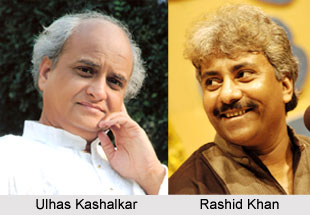 The Sangeet Natak Akademi Award for Hindustani Music (Vocal) is one of the principal categories of the Sangeet Natak Akademi Award. The Sangeet Natak Akademi Award was incepted by the prime body for performing arts in India, Sangeet Natak Akademi in the year 1954. It is considered as the highest national award for performing arts in India and is presented to the talented and successful performers from different fields of performing arts. Mushtaq Hussain Khan was the first person to win the Sangeet Natak Akademi Award for Hindustani Music (Vocal) in the year 1952. Several eminent and extremely talented vocalists of Hindustani Music have won the award since then.
The Sangeet Natak Akademi Award for Hindustani Music (Vocal) is one of the principal categories of the Sangeet Natak Akademi Award. The Sangeet Natak Akademi Award was incepted by the prime body for performing arts in India, Sangeet Natak Akademi in the year 1954. It is considered as the highest national award for performing arts in India and is presented to the talented and successful performers from different fields of performing arts. Mushtaq Hussain Khan was the first person to win the Sangeet Natak Akademi Award for Hindustani Music (Vocal) in the year 1952. Several eminent and extremely talented vocalists of Hindustani Music have won the award since then.
The list of the winners of Sangeet Natak Akademi Award for Hindustani Music (Vocal) is given below:
| Year | Vocal Player | Year | Vocal Player Player |
| 1952 | Mushtaq Hussain Khan | 1980 | Nivruttibua Sarnaik |
| 1953 | Kesar Bai Kerkar | 1981 | Basavaraj Rajguru |
| 1954 | Rajab Ali Khan | 1982 | Vasantrao Deshpande |
| 1955 | Anant Manohar Joshi | 1983 | Mahadev Prasad Mishra |
| 1956 | Rajabhaiyya Poonchhwale | 1984 | Sharafat Hussain Khan |
| 1957 | Rasoolan Bai | 1985 | Kishori Amonkar, Nasir Aminuddin Dagar |
| 1958 | Ganesh Ramachandra Behere | 1986 | Asgari Bai, Firoz Dastur, Manik Varma |
| 1959 | Krishnarao Shankar Pandit | 1987 | C.R. Vyas, Shobha Gurtu, Pandit Jasraj |
| 1960 | Altaf Hussain Khan | 1988 | Padmavati Gokhale Shaligram |
| 1961 | Y.S. Mirashi Buwa | 1989 | Jitendra Abhisheki |
| 1962 | Bade Ghulam Ali Khan | 1990 | K.G. Ginde, Dhondutai Kulkarni |
| 1963 | Omkar Nath Thakur | 1991 | N. Zahiruddin Dagar, Prabha Atre |
| 1964 | Rahimuddin Khan Dagar | 1992 | Ramarao V. Naik, Shiv Kumar Shukla |
| 1965 | Hirabai Barodekar | 1993 | Bala Saheb Poochwale, Rahim Fahimuddin Dagar |
| 1966 | Siddheswari Devi | 1994 | Sulochana Brahaspati, Zia Fariduddin Dagar |
| 1967 | Amir Khan | 1995 | A. Kanan |
| 1968 | Mogubai Kurdikar | 1996 | Dinkar Kaikini, Hafeez Ahmad Khan |
| 1969 | Ramchatur Mallick | 1997 | L.K. Pandit |
| 1970 | Nisar Hussain Khan | 1998 | Puttaraj Gavaigalu, Parveen Sultana, Rajan-Sajan Mishra (Joint Award) |
| 1971 | Mallikarjun Mansur | 1999 | Malabika Kanan |
| 1972 | Begum Akhtar | 2000 | Ajoy Chakraborty, Rita Ganguly |
| 1973 | Gangubai Hangal | 2001 | Abhay Narayan Mallick, Sangameshwar Gurav, Malini Nag |
| 1974 | Shivaputra Siddaramayya Komkali "Kumar Gandharva" | 2002 | Sushila Rani Patel, Sharayu Kalekar |
| 1975 | Bhimsen Joshi | 2003 | Ghulam Mustafa Waris Khan, Yeshwant Balkrishna Joshi |
| 1976 | Narayanrao Vyas | 2005 | Ramashreya Jha |
| 1977 | Girija Devi | 2006 | Rashid Khan |
| 1978 | Khadim Hussain Khan | 2007 | Vidyadhar Vyas, Govardhan Mishra |
| 1979 | Sarachchandra Arolkar | 2008 | Ulhas Kashalkar |




















